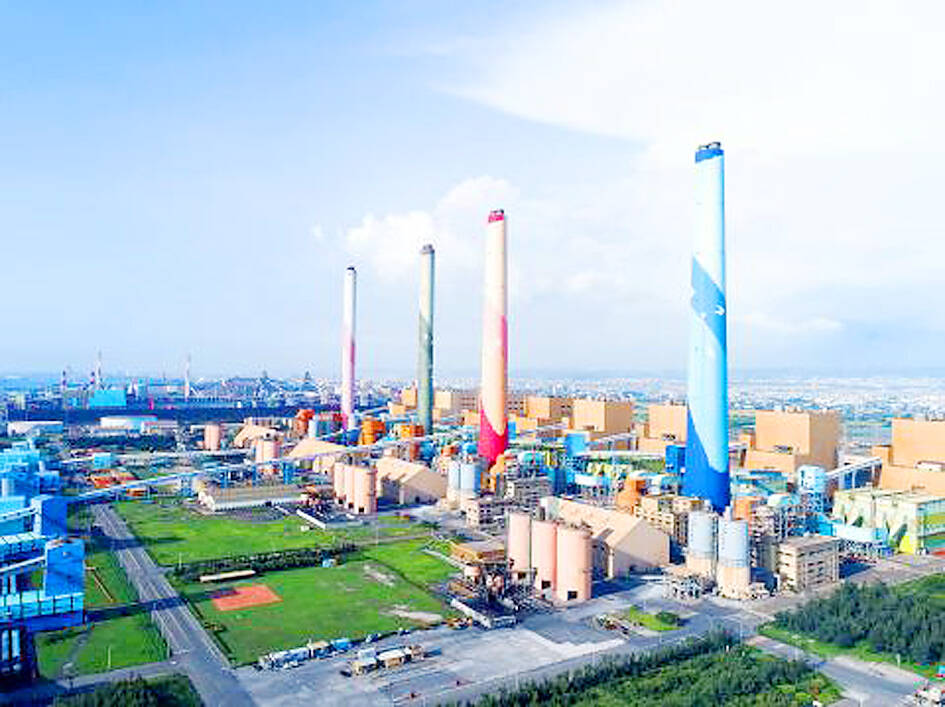The Legislative Yuan yesterday passed a non-binding resolution calling for the phaseout of coal use at the Taichung Power Plant by 2028.
The motion, introduced by Chinese Nationalist Party (KMT) legislators Lo Ting-wei (羅廷瑋), Liao Wei-hsiang (廖偉翔), Huang Chien-hao (黃健豪), Yang Chiung-ying (楊瓊瓔) and Hsu Chiao-hsin (徐巧芯), and Taiwan People’s Party (TPP) Legislator Chang Chi-kai (張?楷), passed in a vote along party lines, with the opposition dominating the 113-seat legislature.
Plans to build more gas-fired units should allow the Taichung plant to eliminate coal by 2028, they said, adding that the plant uses outdated subcritical coal-fired units, which have the lowest power generation efficiency.

Photo: CNA
The resolution said that two newly added gas-fired units in Phase 1 of the Taichung Power Plant, along with the privately owned Chung Chia gas-fired power plant, are scheduled to begin operations by 2026 and could replace the electricity generated by the plant’s coal-fired units.
Under the government’s 2034 target, 71 percent of coal units would still be operational in 2031, which runs counter to its pledge that “for every new gas-fired unit added, one coal unit will be retired,” the resolution said.
The Taichung Power Plant should be prevented from operating six coal-fired and six gas-fired boilers concurrently, the resolution said.

Photo courtesy of the Taichung Environmental Protection Bureau
Democratic Progressive Party (DPP) caucus chief executive Rosalia Wu (吳思瑤) said the Taichung plant was built by the then-KMT government, with its peak coal consumption coinciding with the tenures of then-president Ma Ying-jeou (馬英九), and then-Taichung mayors Jason Hu (胡志強) and incumbent Lu Shiow-yen (盧秀燕) — all KMT members.
Since the DPP took over the presidency in 2016, it has reduced coal consumption by 6 million tonnes and air pollution by 77 percent, Wu said.
DPP Legislator Chuang Jui-hsiung (莊瑞雄) said that the KMT’s and the TPP’s opposition to coal to protect public health is just a show given their advocacy of restarting the Ma-anshan Nuclear Power Plant in Pingtung County.
Chuang accused the two parties of “ruthless politicking” with their push for nuclear power and leaving more nuclear waste in Pingtung County.
State-run Taiwan Power Co (台電) issued a statement later yesterday, saying it has set 2034 as the target year to facilitate the phaseout of coal power to avoid jeopardizing the nation’s energy supply.
The company is to decommission two coal-fired boilers at the plant by next year, and progress on plans to end all coal use by 2034 is on track, it said.
Additional reporting by Lin Hsin-han

Right-wing political scientist Laura Fernandez on Sunday won Costa Rica’s presidential election by a landslide, after promising to crack down on rising violence linked to the cocaine trade. Fernandez’s nearest rival, economist Alvaro Ramos, conceded defeat as results showed the ruling party far exceeding the threshold of 40 percent needed to avoid a runoff. With 94 percent of polling stations counted, the political heir of outgoing Costa Rican President Rodrigo Chaves had captured 48.3 percent of the vote compared with Ramos’ 33.4 percent, the Supreme Electoral Tribunal said. As soon as the first results were announced, members of Fernandez’s Sovereign People’s Party

MORE RESPONSIBILITY: Draftees would be expected to fight alongside professional soldiers, likely requiring the transformation of some training brigades into combat units The armed forces are to start incorporating new conscripts into combined arms brigades this year to enhance combat readiness, the Executive Yuan’s latest policy report said. The new policy would affect Taiwanese men entering the military for their compulsory service, which was extended to one year under reforms by then-president Tsai Ing-wen (蔡英文) in 2022. The conscripts would be trained to operate machine guns, uncrewed aerial vehicles, anti-tank guided missile launchers and Stinger air defense systems, the report said, adding that the basic training would be lengthened to eight weeks. After basic training, conscripts would be sorted into infantry battalions that would take

GROWING AMBITIONS: The scale and tempo of the operations show that the Strait has become the core theater for China to expand its security interests, the report said Chinese military aircraft incursions around Taiwan have surged nearly 15-fold over the past five years, according to a report released yesterday by the Democratic Progressive Party’s (DPP) Department of China Affairs. Sorties in the Taiwan Strait were previously irregular, totaling 380 in 2020, but have since evolved into routine operations, the report showed. “This demonstrates that the Taiwan Strait has become both the starting point and testing ground for Beijing’s expansionist ambitions,” it said. Driven by military expansionism, China is systematically pursuing actions aimed at altering the regional “status quo,” the department said, adding that Taiwan represents the most critical link in China’s

‘REALLY PROUD’: Nvidia would not be possible without Taiwan, Huang said, adding that TSMC would be increasing its capacity by 100 percent Nvidia Corp CEO Jensen Huang (黃仁勳) on Saturday praised and lightly cajoled his major Taiwanese suppliers to produce more to help power strong demand for artificial intelligence (AI), capping a visit to the country of his birth, where he has been mobbed by adoring fans at every step. Speaking at an impromptu press conference in the rain outside a Taipei restaurant, where he had hosted suppliers for a “trillion-dollar dinner,” named after the market capitalization of those firms attending, Huang said this would be another good year for business. “TSMC needs to work very hard this year because I need a lot